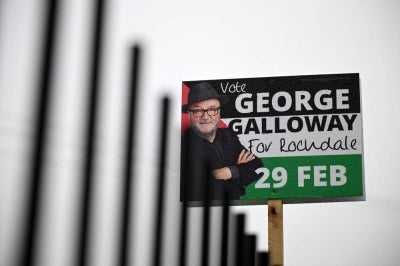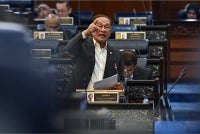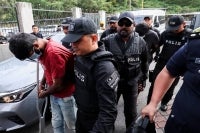Trump’s US$4 trillion Middle East tour casts shadow over Gaza genocide
For many, the contrast was as stark as it was disturbing: a genocide unfolding in real-time, while global powers signed contracts and posed for cameras.
MOHAMMED H. ALAQAD
AS bombs fell across Gaza and hospitals crumbled under fire, United States (US) President Donald Trump toured Gulf capitals celebrating trillion-dollar deals.
In just 48 hours, while over 150 Palestinians were killed, including five journalists and the last hospital in Khan Younis was reduced to rubble, Trump declared that his Middle East tour had generated up to US$4 trillion in trade and military agreements.
For many, the contrast was as stark as it was disturbing: a genocide unfolding in real-time, while global powers signed contracts and posed for cameras.
Trump’s recent short tour of key Gulf states has triggered renewed criticism from international observers, who said that the multi-trillion-dollar trip has effectively sidelined the humanitarian catastrophe in Gaza.
In an official statement, Trump declared that his two-day tour through the Middle East could generate between US$3.5 trillion and US$4 trillion in deals, largely through high-profile agreements with Saudi Arabia, Qatar and the United Arab Emirates (UAE).
While economic headlines dominated international coverage, human rights groups and political analysts in Malaysia argue that the visit has deepened the moral crisis surrounding the Gaza genocide, which has claimed thousands of lives and left over a million Palestinians displaced amid unrelenting Israeli airstrikes.
This visit has essentially redefined the global priority, arms and business first, human lives second.
The fact that these deals were celebrated while Gaza’s hospitals were collapsing shows the extent to which Palestinian suffering has been normalised.
Among the deals finalised, Trump secured a US$142 billion arms agreement with Saudi Arabia, a US$600 billion investment pledge from Saudi Arabia in the US and a massive US$1.2 trillion trade agreement with Qatar.
Additionally, business deals valued at more than US$240 billion were signed, along with a US$1.4 trillion investment from the UAE over 10 years in the US. These agreements were signed even as images from Gaza showed families burying their loved ones and children being pulled from the rubble.

Following Trump’s visit, intense and widespread bombing engulfed every corner of the Gaza Strip, resulting in the killing of over 150 Palestinians in a single day. Among the casualties were five journalists and the last remaining hospital in Khan Younis, the Gaza European Hospital was partially destroyed.
A US$4 trillion trip during a genocide is not only ethically tone-deaf, but also a calculated silence. It signals that Gaza can burn, so long as the pipelines and profit margins remain untouched.
A notable development during Trump’s visit was the revival of the so-called “regional solution” strategy, which encourages Arab states to normalise ties with Israel while sidelining the core Palestinian issue.
Reports from Israeli media revealed that Prime Minister Benjamin Netanyahu sent envoys to Doha for indirect talks with Hamas, facilitated by Trump’s special envoy, Stephen Witkoff.
Adding to the controversy, senior Hamas official Basem Naim said Witkoff had promised the lifting of the Gaza blockade and an immediate ceasefire in exchange for the release of American-Israeli soldier Edan Alexander.
While Hamas fulfilled its part of the deal, Naim alleged that the US administration broke its promise and failed to respond to follow-up communications.
This is not the first time we’ve seen power diplomacy exploit Palestinian concessions. Gaza becomes a bargaining chip, not a humanitarian priority.

Beyond Gaza, Trump’s visit bolstered regional power figures, most notably Saudi Crown Prince Mohammed bin Salman. Observers note that this visit mirrors Trump’s earlier support for bin Salman’s rise to power following the 2017 Riyadh Summit, a strategy that critics say continues to whitewash Saudi Arabia’s role in regional conflicts and internal repression.
Gaza, however, remained absent from Trump’s public remarks. Instead, his speeches focused on countering Iran, rebuilding ties with the Assad regime in Syria and promoting the Middle East economic corridor, a major trade route from the Gulf to Europe via Turkiye. Analysts believe these initiatives signal an American pivot to economic diplomacy over conflict resolution.
Trump’s silence on Gaza isn’t diplomatic oversight; it’s political calculation. To avoid mentioning Gaza while promoting deals worth trillions is to effectively endorse Israel’s impunity.
Meanwhile, tensions between Trump and Netanyahu surfaced during the tour. According to leaked Israeli briefings, Trump expressed frustration over Netanyahu’s refusal to de-escalate in Gaza, warning Israeli hostage families that “military pressure may endanger their loved ones.” Nonetheless, Netanyahu reportedly intensified attacks on Gaza to maintain the support of his right-wing coalition.
As a result, Netanyahu agreed to dispatch a negotiating team to Qatar to explore a 45-day ceasefire, conditional upon Hamas releasing ten living hostages. Analysts interpret this as a tactical move to balance American pressure with internal political survival.
Trump’s broader strategy, many argue, aims to resurrect the Abraham Accords, with ambitions to extend normalisation to Syria and Lebanon, leveraging the weakened positions of Hezbollah and Iran.
For Palestinians in Gaza, however, the visit underscores a grim reality: global power is trading away their future.
This tour may have delivered economic headlines, but it left behind a deeper moral bankruptcy in international laws toward Palestine.
Dr Mohammed H. Alaqad is the Senior Research Fellow at Hashim Sani Centre for Palestine Studies, Universiti Malaya who has been closely monitoring the discourse around the Gaza genocide.
The views expressed in this article are his own and do not necessarily reflect those of Sinar Daily.
Download Sinar Daily application.Click Here!














